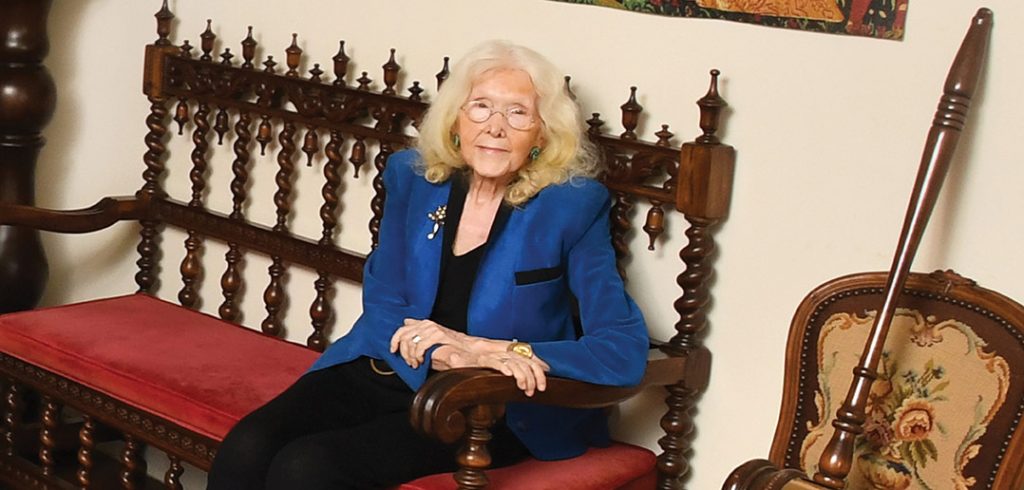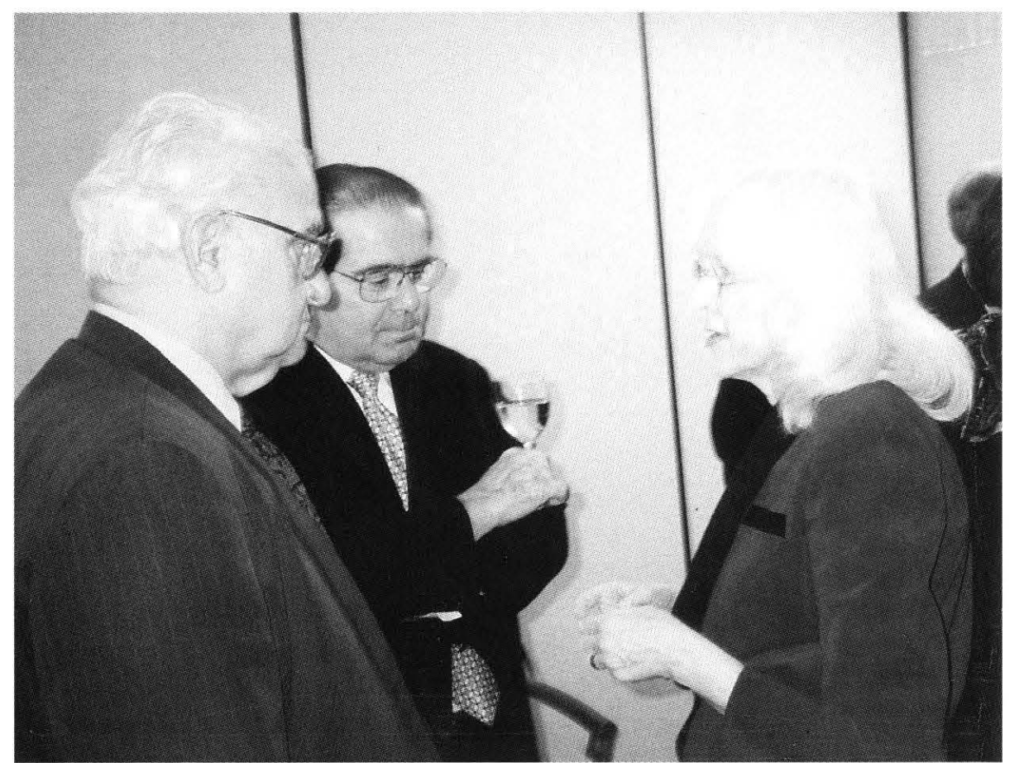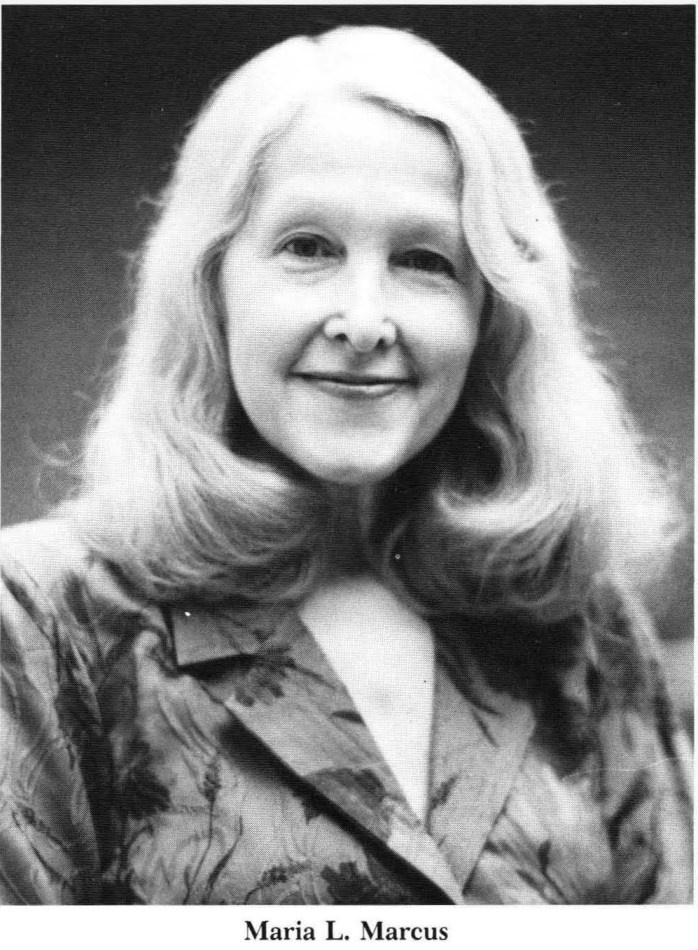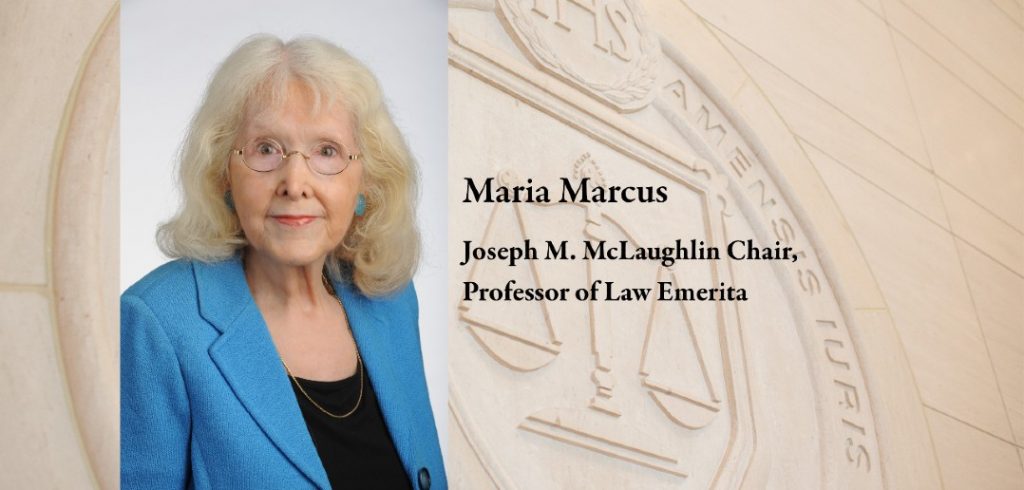The Fordham Law community mourns the passing of Professor Maria Eleanor Lenhoff Marcus, Joseph M. McLaughlin Chair and Professor of Law Emerita and moderator of the Moot Court Board. Marcus was a member of the Fordham Law faculty for 33 years—from 1978 until her retirement in 2011—and was the second woman to become a tenured full professor at the Law School. She died April 27 at age 88.
In addition to her teaching and scholarship, Marcus shepherded multiple generations of students in Fordham Law’s Moot Court program, serving as the faculty moderator and coach for 42 years.
“A good argument isn’t a speech that’s shouted at judges—it’s a conversation,” Marcus said in 2019. “It’s a conversation between intellectuals about a really interesting topic that is wide open on every side.”
“Maria’s life and career are the stuff of legend,” reflected Dean Matthew Diller. “She tempered her deep commitment to excellence with compassion and love. She was a warm and supportive mentor to me as she was to so many others in our community. Countless Fordham lawyers have made their way in the profession by reliance on the ‘Marcus method’ of written and oral advocacy, which requires discipline, clarity of expression, and keen legal analysis. Many still hear Maria’s voice in their heads providing a firm compass to draw on when they encounter challenges. I will miss Maria, as we all will, and I am grateful to have had her as a friend, colleague and mentor.”

Before joining the Fordham Law faculty, Marcus had a distinguished legal career, serving as a fellow with the New York Bar Foundation, associate counsel for the NAACP’s national office from 1961 to 1967, assistant attorney general for New York State from 1967 to 1978, chief of the litigation bureau for the attorney general of New York State from 1976 to 1978, and vice president of the Association of the Bar of the City of New York from 1995 to 1996. As one of the leading Supreme Court advocates in the 1970s, she argued—and won—six cases before the U.S. Supreme Court on behalf of New York State, including New York Telephone v. New York State Department of Labor (1979), which secured unemployment benefits for striking workers. A drawing that memorialized the moment hung in her Upper West Side home.
Even after her retirement from Fordham Law in 2011, she continued to serve as moderator to the Moot Court Board and devoted countless hours to coaching and mooting numerous competitors until 2021. In recent years, students would go to Marcus’ apartment to practice their presentations and receive the benefits of her critique and advice.
“She was an extraordinary teacher … [and made] possible national, regional, and local successes by our students,” said Norris Professor of Law and Dean Emeritus John Feerick ’61. “She was beloved by the many students she mentored and coached over four decades and was admired by all her colleagues for her dedication. She was one in a million.”
“Every year during his tenure, then Fordham University President [Joseph] O’Hare, S.J. would come to one of our faculty meetings and never failed to bemoan his inability to hire a football coach who would compile a record approaching that of Maria’s Moot Court teams,” said Brendan Moore Chair in Advocacy and Professor James Kainen. “Besides Moot Court, Maria was a legendary teacher and role model for generations of Fordham Law students and faculty. To the delight of her students (and the consternation of her colleagues who could not duplicate the feat), Maria would walk into class on the first day having memorized the names and faces of all her students. She would then model in her Socratic questioning the analytic precision that is the hallmark of the excellent lawyer.”

Reflections from the Fordham Law Community
Marcus was beloved by both faculty and students alike, not only for her scholarship and experience in the courtroom, but for her collegiality and mentorship as well.

“Maria was a wonderful mentor to me and gave me wise advice about how to give feedback to students about their exam performance,” said Professor Helen Bender, who joined the Fordham Law faculty in 1979, a year after Marcus arrived. “Many of us enjoyed Christmastime with Maria and I fondly recall how beautifully she sang Christmas carols. She was just a wonderful presence and a fixture for all of us at the Law School.”
As noted by Adjunct Professor Jim Zucker ’97, a teacher in the Moot Court program, “Students became moot court advocates, became lawyers, became teachers, all under Professor Marcus’ tutelage.”
Adjunct Professor Michelle Marsh ’96 called Marcus the “architect of Fordham’s award-winning moot court program,” saying “The tangible results of her brilliant teaching methods are contained in the Law School’s trophy cases. Far beyond awards though, she touched the hearts of every student that went through the Moot Court program [and] every single student aimed to make her proud.”
“Professor Marcus made me a better lawyer and person,” said Palmina Fava ’97. “I admired everything about her—from her skills as an oral advocate and as a writer, to her love for her family and the traditions they shared, to the freeness with which we danced at my wedding to ‘Hot Hot Hot’ (which remains one of my fondest memories), to the way she knew just what to say when her guidance was sought, to her intellectual curiosity, which remained strong to her final days, and so much more.”
Judge Richard Sullivan of the U.S. Court of Appeals for the Second Circuit, who previously taught courses on white collar crime and trial advocacy as an adjunct professor at Fordham Law, said, “I have had so many lawyers appear in front of me who are excellent practitioners of law, who are ethical, but [who are] also incredibly effective, because they have learned from the Maria Marcus School of Advocacy. That legacy is going to continue for many more decades, and I have no doubt that the Fordham Moot Court program will continue to shine because the ‘Maria Marcus method’ is ingrained in that program.”
A Beloved Law Professor and “Cultural Symbol for Moot Court”
In 1981, Marcus’ first class of students gave her the Law School’s Eugene J. Keefe Award, presented to the person who has made the most important contribution to the School in a given year. She was named Teacher of the Year by students in 2001, received the Louis J. Lefkowitz Award from the Fordham Urban Law Journal during the 2016 alumni banquet, and received the Dean’s Medal of Recognition from then Dean Michael M. Martin in 2011. As he presented her the medal, Martin said of her, “She insists … on excellence. Thus, she is doing more than preparing her students for moot court competitions; she is preparing them to be great lawyers—Fordham lawyers.”

Katherine Anne Boy Skipsey ’20, who ranked eighth in the world during the preliminary rounds of the 2019 Philip C. Jessup International Law Moot Court Competition, spoke about Marcus’ transformative guidance. “At the time, I thought that speaking for 22 minutes was impossible,” she said of her experience in 2019. “But little did I know that a year later, as part of the federal litigation clinic, one of my cases I had to argue before the Second Circuit [lasted] almost 50 minutes. I wouldn’t have been able to do it if it hadn’t been for all the great preparation I got from Professor Marcus. I would like to say to her: you are not just a professor who has taught us and led us into great careers, but you have become a cultural symbol for moot court.”
In 2019, Marcus was presented with an award for her decades of service as a legal educator at the 2nd Annual Women’s Leadership Institute at Fordham Law. A video tribute emphasized her inspiring brand of teaching and the profound impact she continued to have on her students as they continued their legal careers.
“For anyone fortunate to study with, be mentored by, or be coached for a moot court competition by Professor Marcus, the experience is extraordinary: her sharp mind, keen observations, and high standards have kept us striving to do our best for over forty years,” wrote Professor Elizabeth Cooper in the “100 Years of Women at Fordham: A Foreword and Reflection” at the time. Professor Cooper also noted how Marcus was “widely regarded as the ‘dean’ of the women faculty.”

Marcus’ piece of advice for the young women in the audience at the ceremony was, “Seek out what you really love, and then do it.”
In 2021, Fordham Law faculty, alumni, and students gathered virtually to share fond moot court memories as well as send their best wishes and congratulations to Marcus upon her retirement from the Moot Court program.
“I love being here, hearing these things, and seeing how all of you have done so beautifully,” Marcus said during the event. “I think the national team’s success [being crowned as champions in the country’s premier moot court event] was a particular highlight in 1995, but there were so many highlights. It’s hard to count them all. That’s because you, the students, put in the work. You, the students, applied what you got from, I’m sure, many professors, and I’m just so delighted to hear of your successes.”


A Spotlight on Marcus’ Scholarship
Marcus graduated from Yale Law School in 1957 as one of a handful of women in her class. She earned a B.A. in English from Oberlin College in 1954. She brought her commitment to fighting for justice to her scholarly work, authoring numerous law review articles on topics ranging from domestic violence to school desegregation to regulation of hate speech on the airwaves. In 1981, Marcus wrote one of the earliest law review articles dealing with domestic violence, “Conjugal Violence: The Law of Force and the Force of Law,” as reported by The Advocate that same year.
Marcus’ work also drew on her life experiences fleeing Nazi persecution. When she was a child, Marcus and her family fled Austria in 1938 on the day of the Anschluss, the annexation of Austria by Nazi Germany. Her Jewish father, Justice Arthur Lenhoff of the Austrian Constitutional Court, the country’s highest court, was on the Gestapo blacklist for his legal decisions on religious equality in universities. The family fled first to Switzerland, then to England, before finally settling in the U.S., where Judge Lenhoff taught law at the University of Buffalo. As Marcus recalled in her article, “Austria’s Pre-War Brown v. Board of Education”—the lead article in Fordham’s Urban Law Journal (Volume 32) in 2004, which was dedicated to her father—Justice Lenhoff, “persistently argued that the Student Orders [which sought to impose racial classification in Austrian universities] were unconstitutional under the equality principle.”
Marcus spoke on a panel in 2001, discussing how the proceeds of Holocaust restitution settlements should be allocated. She shared a personal experience on the matter, explaining how a bronze bust of her father, lost during World War II, was later found in an antique shop in Vienna. “My father called a friend in Vienna to rush over to the antique shop to buy it and ship it to us,” she recalled. “I’ll never forget the joy when it arrived. It was the only thing that was saved from our old apartment, and it was a link to his former identity, which had not been destroyed.”
Marcus is survived by her three children Valerie Marcus, Nicole Marcus, and Eric Marcus; as well as their respective spouses, Peter Miller, Paul Church, and Lydia Marcus; and her six grandchildren Nora, Anna, Lena, Max, Lola, and Beatrice. She was predeceased by her husband, Norman Marcus, an influential former general counsel of the New York City Planning Commission.
The memorial service for Professor Maria Marcus will be on Sunday, May 1, at 2:30 p.m., at Riverside Memorial Chapel.
Riverside Memorial Chapel
180 W 76th St
New York, NY 10023
In lieu of flowers, donations can be made to the Fordham Law School Moot Court program, Heifer International, the Southern Poverty Law Center, and the Jewish Foundation for the Righteous in Marcus’ memory.
Law School leaders will work with Marcus’ family to create a memorial program at the Law School.
Please celebrate Professor Marcus’ life by sharing your memories of her here.







